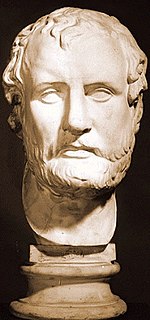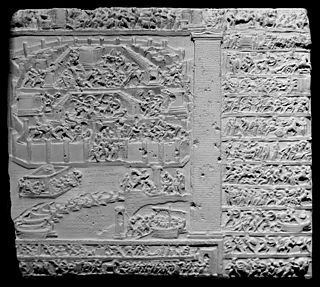Alexis was a Greek comic poet of the Middle Comedy period. He was born at Thurii in Magna Graecia and taken early to Athens, where he became a citizen, being enrolled in the deme Oion (Οἶον) and the tribe Leontides. It is thought he lived to the age of 106 and died on the stage while being crowned. According to the Suda, a 10th-century encyclopedia, Alexis was the paternal uncle of the dramatist Menander and wrote 245 comedies, of which only fragments now survive, including some 130 preserved titles.
Antiphanes is regarded as the most important writer of the Middle Attic comedy with the exception of Alexis.

Eupolis was an Athenian poet of the Old Comedy, who flourished during the time of the Peloponnesian War.
Hermippus was the one-eyed Athenian writer of the Old Comedy who flourished during the Peloponnesian War.
Strattis was an Athenian comic poet of the Old Comedy. According to the Suda, he flourished later than Callias Schoenion. Therefore, it is likely that his poetry was performed at the 92nd Olympiad, that is, 412 BC.

Stesichorus was the first great lyric poet of the West. He is best known for telling epic stories in lyric metres but he is also famous for some ancient traditions about his life, such as his opposition to the tyrant Phalaris, and the blindness he is said to have incurred and cured by composing verses first insulting and then flattering to Helen of Troy.
Nicochares was an Athenian poet of the Old Comedy, son of the comic playwright Philonides and contemporary with Aristophanes. The titles of Nicochares' plays, as enumerated by Suidas, are, Αμυμώνη (Amymone), Πέλοψ (Pelops), Γαλάτεια (Galatea), Ηρακλής Γάμων, Ηρακλής Χορηγός, Κρήτες (Cretans), Λάκωνες, Λημνίαι, Κένταυροι (Centaurs), and Χειρογάστορες. Although, as Augustus Meineke had ingeniously conjectured, the two first titles may merely be two different names from the same comedy, considering the fact that Πέλοψ does not occur in its alphabetical place, and, in reference to the latter, the name "Oenomaüs" occurs in quotations from Αμυμωνη mentioned by Athenaeus.
Eunicus is the name of two different people in Classical history:
NICOPHON, the son of a certain Theron, was an Athenian comic poet, a contemporary of Aristophanes in his later years. Athenaeus states that he belonged to Old Comedy, but it is more likely that he belonged to Middle Comedy. We learn from the argument of the Plutus of Aristophanes that he exhibited one of his plays, called Ἄδωνις Adonis, in 388 BC, the date Aristophanes exhibited his Plutus.
Chionides an Athenian comic poet of the 5th century BC, contemporary of Magnes. The Suda says that Chionides flourished eight years before the Greco-Persian Wars, that is, 487 BC. But Augustus Meineke thinks that Chionides flourished no earlier than 460 BC. In confirmation of this date he quotes from Athenaeus, who quoted a fragment of Chionides' Πτωχοί (Beggars), which mentions Gnesippus, a poet contemporary with Cratinus. Aristotle also notes that Chionides "lived long after Epicharmus". But Athenaeus also noted that some critics at the time regarded Chionides' Πτωχοί as spurious. Similarly, some scholars strongly argue against the genuineness of Aristotle's observations.
Ephippus of Athens was an Ancient Greek comic poet of the middle comedy.
Epigenes of Athens was an Athenian comic poet of the middle comedy.
Epinicus or Epinikos, was an Athenian comic poet of the new comedy. Two of his plays are known, Hypoballomenai and Mnêsiptolemos. The latter title determines his date to the time of Antiochus III the Great, about 217 BC, for Mnesiptolemus was an historian in great favour with that king.
Thessalus,, a physician from ancient Greece, and the son of Hippocrates, the famous physician. He was the brother of Draco, and father of Gorgias, Hippocrates III, and Draco II. He lived in the 5th and 4th centuries BC and passed some of his time at the court of Archelaus I of Macedon,. He was one of the founders of the Dogmatic school (Dogmatici) of medicine, and is several times highly praised by Galen, who calls him the most eminent of the sons of Hippocrates, and says that he did not alter any of his father's doctrines. No doubt when he performed the difficult task of preparing the writings of Hippocrates for publication after his death he made some additions of his own, which were sometimes not quite worthy of that honour. He was also supposed by some of the ancient writers to be the author of several of the works that form part of the Hippocratic collection, which he might have compiled from notes left by his father.
Melanippides of Melos, one of the most celebrated lyric poets in the use of dithyramb, and an exponent of the "new music."
Ameipsias of Athens was an Ancient Greek comic poet, a contemporary of Aristophanes, whom he twice bested in the dramatic contests. His Konnos (Κόννος) gained a second prize at the City Dionysia in 423, when Aristophanes won the third prize with The Clouds.
Archippus was an Athenian poet of the Old Comedy. His most famous play was the Fishes, in which he satirized the fondness of the Athenian epicures for fish. The Alexandrian critics attributed to him the authorship of four plays previously assigned to Aristophanes. Archippus was ridiculed by his contemporaries for his fondness for playing upon words.
Anaxippus was an Athenian comic poet of the new comedy, who was contemporary with Antigonus and Demetrius Poliorcetes, and flourished about 303 BC. We have the titles of four of his plays, and perhaps of one more.
Apollodorus of Gela in Sicily was a New Comedy playwright. According to the Suda and Eudokia Makrembolitissa, he was a contemporary of Menander, and accordingly lived between the years 340 and 290 BCE.
Apollophanes of Athens was a poet of the old Attic comedy. He appears to have been a contemporary of Strattis, and to have consequently lived about Olympiad 95.







